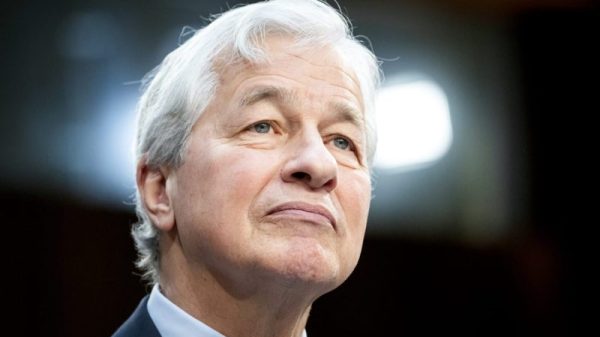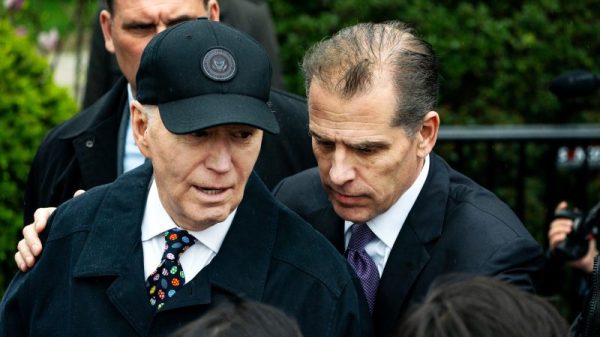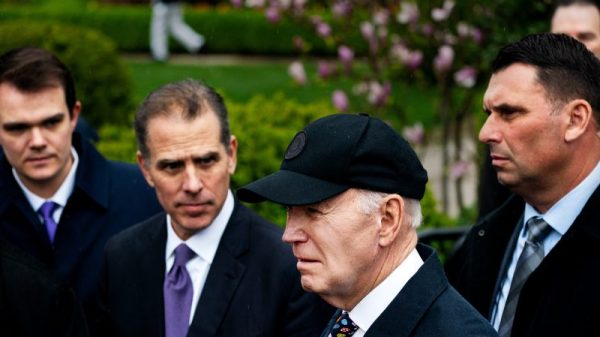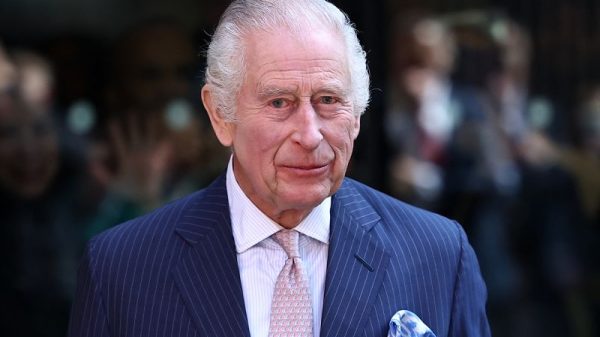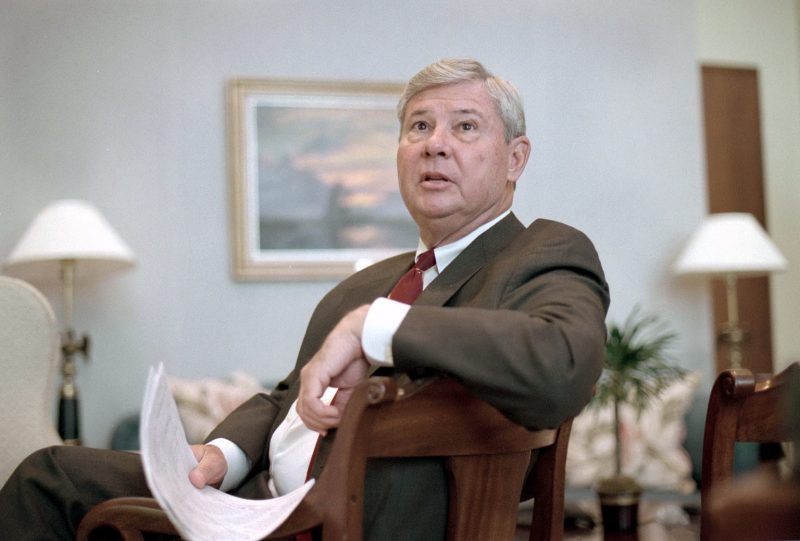Bob Graham, a consensus-building moderate Democrat who as a two-term Florida governor and a three-term U.S. senator became one of the most popular politicians in the state’s history and then one of the Senate’s most ardent opponents of the Iraq War, died April 16 at the age of 87.
His daughter Gwendolyn Graham confirmed the death in a statement on social media. No further details were immediately available.
Mr. Graham retired from the Senate in 2005 after nearly four decades in public office. Apart from a short-lived campaign for the Democratic presidential nomination in 2004, he never failed in a run for elected office. He was also among the relatively few (five) Democrats elected governor of Florida in about as many decades, as the long-dominant state party lost its grip on what had become a volatile swing state trending to the right.
Mr. Graham, whose half brother Philip, sister-in-law Katharine and nephew Donald were publishers of The Washington Post, made an early fortune in real estate development, helping to turn his father’s dairy and cattle farm into a planned suburban community eventually called Miami Lakes. He made millions of dollars through real estate investments while pursuing a political career. He won a seat in the Florida House in 1966 and served for much of the 1970s in the state Senate.
His father, also a state legislator, had lost the Democratic primary for governor in 1944, a disappointment that Mr. Graham said fueled his interest in politics. With Gov. Reubin Askew (D) term-limited in 1978, Mr. Graham won a crowded Democratic primary to succeed him and then trounced his Republican opponent, Jack Eckerd, of the Eckerd drugstore empire, in the general election.
Mr. Graham had little statewide recognition going into the 1978 race and was perceived in some circles as a rich liberal from South Florida. But his campaign got a boost from the “workday” strategy orchestrated by pioneering political consultant Robert Squier.
Long known as “D. Robert Graham,” he began going by “Bob,” and he was filmed working various jobs — waiting tables, laying bricks, paving roads, shoveling manure, packing citrus fruit, teaching inner-city students — around the state’s 67 counties.
What began as a campaign stunt became a regular feature of Mr. Graham’s governorship. From the outset, he emphasized that his “workdays” were not photo ops. He didn’t put on an apron or a pair of work boots for an hour and then leave. He stayed after the camera crews departed and worked a full day, getting to know his constituents and leaving an indelible impression on Floridians of all political persuasions.
“I took away a learning of not only how people earn their living but how they live their lives,” he later told the Orlando Sentinel.
In Tallahassee, the state capital, he spearheaded ambitious environmental efforts, including the 1983 Save Our Everglades campaign, which helped rescue the state’s most famous natural resource from development and ecological deterioration.
During Mr. Graham’s first term, Florida struggled with a massive influx of refugees from Cuba and Haiti, and it took years to secure federal aid for their welfare and resettlement. Meanwhile, the state was beset by rising crime, including rampant drug smuggling, and the Liberty City section of Miami was racked by riots in 1980 after an all-White jury acquitted police officers who fatally beat a Black insurance agent during a traffic stop.
As opponents of his 1982 reelection campaign accused him of being “soft on crime,” Mr. Graham played up his support for the death penalty. The U.S. Supreme Court had ended an effective moratorium on capital punishment in 1976, and Mr. Graham sent John Spenkelink, a convicted murderer, to the electric chair in May 1979. It was the first execution in Florida in more than a decade. With broad popular support, he signed 16 death warrants as governor.
Mr. Graham coasted to reelection and won a U.S. Senate seat in 1986 by defeating a one-term conservative Republican incumbent, Paula Hawkins. In Washington, he was less known for specific legislation than for his ability to work across the aisle on bills affecting environmental and education programs, health care for the elderly and infirm, and efforts to fight drug crime.
“What I think I’m best at is bringing people together around an honorable and reasonable position,” Mr. Graham told the Tampa Tribune in 1998. “My approach to getting things done in the Senate is that you start at the 50-yard line and you begin to build out in each direction until you get a majority. Very few things happen, get accomplished, when you start in the end zone.”
Mr. Graham was floated repeatedly as a prospective vice-presidential candidate but never got the nod. Part of the problem, according to many political observers, was his lack of charisma. He was mocked for keeping notebooks in which he recorded the events of his day in minute detail. One entry read: “8:45-9:35 — Kitchen, family room. Eat breakfast, branola cereal with peach.”
The Post once described him as a “sober, conscientious, unfailingly courteous grandfather who couldn’t light up a room with a barrel of Iraqi crude and a Zippo.”
His public persona altered noticeably after the al-Qaeda terrorist attacks of Sept. 11, 2001, which happened while he was chairman of the Senate Intelligence Committee. Mr. Graham was among a handful of senators who became outspoken opponents of an invasion of Iraq, which President George W. Bush had proposed, ostensibly on the grounds that Saddam Hussein’s tyrannical regime was hiding weapons of mass destruction.
From the Senate floor in October 2002, five months before the U.S.-led invasion, Mr. Graham argued with uncharacteristic fervor that an attack on Iraq would distract from the pursuit of terrorist groups, which he said represented a greater threat to the United States than the one posed by Saddam Hussein. He also warned that an invasion might well provoke more terrorist strikes.
“We are not talking about a threat 90 days from now!” he roared with startling emotion. “We are not talking about a threat that may come a year from now if nuclear material is made available! I am talking about a threat that could happen this afternoon! … If you believe that the American people are not going to be at additional threat, then, frankly, my friends — to use a blunt term — blood is going to be on your hands.”
Mr. Graham and Rep. Porter Goss (R-Fla.), who chaired the House Intelligence Committee and later served as CIA director, spent 10 months leading joint oversight hearings into intelligence failures related to 9/11.
Released in 2003, their report called for an overhaul of intelligence gathering, including the dismantling of barriers between intelligence agencies. Their work, however, was largely overshadowed by the independent 9/11 Commission, which offered similar recommendations.
The same year, Mr. Graham launched a bid for the Democratic presidential nomination, contending that Bush had diverted resources and attention from the fight against terrorism to Iraq’s supposed weapons of mass destruction, which were never found.
“My life has been a progression, with a run for president being a logical conclusion,” he told The Post at the time. “What I had lacked before September 11 was the ingredient of passion. Now I have the passion.” But he attracted little support and dropped out before the primaries.
As a senator, Mr. Graham spent so much time in his home state that he never managed to create a dynamic national persona, observed Tom Fiedler, a former executive editor of the Miami Herald who as a reporter had covered much of Mr. Graham’s early career. “He was never able to do nationally what he had done in Florida,” Fiedler said. “He was always going to be the senator from Florida. That is a negative when you run for president.”
Daniel Robert Graham was born in Coral Gables, Fla., on Nov. 9, 1936, and grew up in a coral rock home in Pennsuco, near the Everglades in Dade County (now Miami-Dade County). His father, Ernest “Cap” Graham, was a gruff, demanding dairy and cattle farmer, and his mother, the former Hilda Simmons, was a schoolteacher. Cap Graham’s first wife died and left him with two sons, Philip and William, and a daughter, Mary.
Bob Graham worked for his father. He drove tractors, milked cows and showed prize Holsteins in the 4-H Club. At 16, he was named the county’s “best all ’round teenage boy” by the Miami Herald. The newspaper noted his skill as a debater at Miami Senior High School, his leadership in student government, and his talent for raising and breeding of Angus cattle, which he described as his future occupation.
However, his older half brother Philip, a Harvard Law School graduate 21 years Bob Graham’s senior, urged him to pursue other ambitions. At the time, Philip Graham was a Washington power broker who had become publisher of The Post in 1946, six years after marrying Katharine Meyer, whose father, financier Eugene Meyer, owned the newspaper. Before he died by suicide in 1963, Phil Graham mentored his younger brother, encouraging him to seek a law degree at Harvard and introducing him to members of Washington’s political elite.
“I felt as if my father had passed away,” Bob Graham later told the Orlando Sentinel, speaking of Phil Graham’s death. He graduated from the University of Florida in 1959 and, as his half brother had advised, from Harvard Law School in 1962.
In 1959, he married Adele Khoury, a classmate at the University of Florida. They had four daughters, Gwendolyn, Glynn, Arva and Kendall. Gwendolyn Graham (D-Fla.) served in the U.S. House of Representatives from 2015 to 2017. She ran unsuccessfully for her party’s nomination for governor in 2018. A complete list of survivors was not immediately available.
After his presidential run, Mr. Graham created the Bob Graham Center for Public Service at the University of Florida. “My attitude to life is you’re always looking forward,” he told the Orlando Sentinel. “I appreciated and very much enjoyed my political life. But I’ve made the mental transition to the future.”





